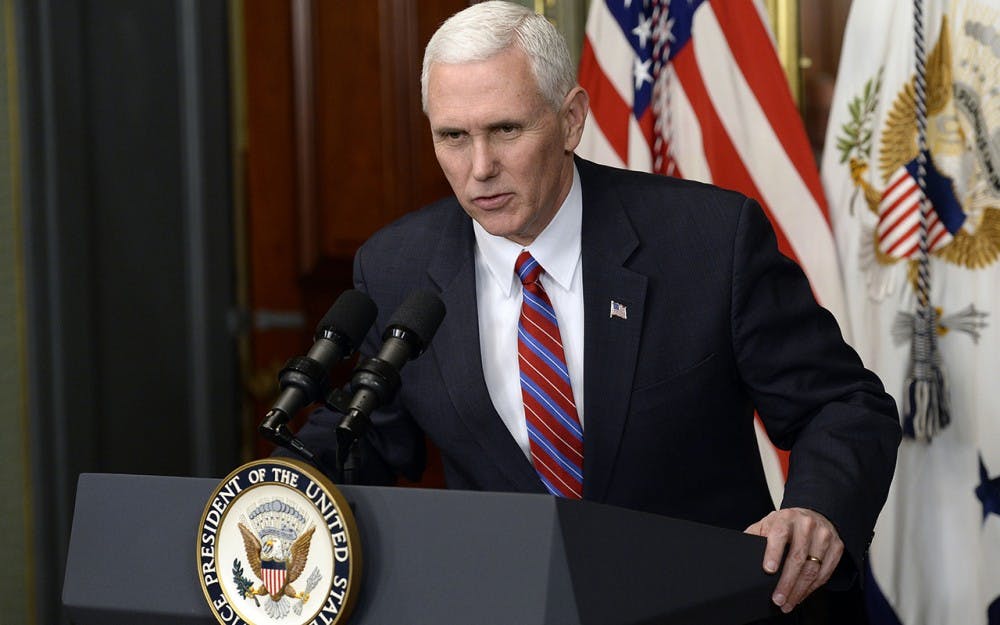A lawsuit for Vice President Mike Pence’s emails is at the Indiana Supreme Court’s doorstep and could have a major effect on government transparency in the state.
The lawsuit, filed by Indianapolis labor lawyer William Groth, centers on a 2014 records request for then-Gov. Pence’s emails. Pence’s lawyers argued Pence complied with the records request to a fair extent and the judiciary has no right to force him to release some sensitive documents that he withheld because doing so would interfere with the core function of the executive branch.
If the court decides to take the case, the decision could determine standards for the governor’s office in future records requests.
Pence’s team is trying to narrow public access, Groth’s attorney, Greg Bowes, said. However, he added, for government transparency to function, the government can’t hide from its people.
“Every time they press for a narrower idea of what should be considered public record, they’re effectively destroying public transparency,” Bowes said.
In December 2014, Groth requested documents pertaining to Pence’s decision to have Indiana join a lawsuit to challenge one of then-President Barack Obama’s executive orders. When then Indiana Attorney General Greg Zoeller said he wouldn’t represent the state if it joined the lawsuit, Pence had to spend taxpayer money to hire private legal counsel.
Groth requested all correspondence and documents relating to Pence’s choice to hire private counsel. When the documents Pence released didn’t appear to meet the standards of the request, Groth sued. When the trial court sided with Pence, Groth appealed.
Among the heavily redacted documents Groth received was an email from the Texas governor’s chief of staff, who urged recipients to join the lawsuit. Attached to the email was a document prepared by the Texas attorney general’s office, which outlined "the legal theories supporting the State [of Texas’] legal challenge to the President’s recent executive orders on immigration,” according to court documents.
Pence didn’t release the attached document, and he argued he shouldn’t have to release it because it involved “deliberative material,” which is material used in decision-making for the executive branch. Generally, the governor can withold or release deliberative material at their own discretion.
Pence also argued releasing the attachment would violate the confidentiality of the attorney-client relationship, although Indiana had not yet joined the lawsuit at the time the email was sent.
Additionally, Pence said the court couldn’t force him to produce the attachment or hand over the files unredacted under a provision in the Indiana constitution regarding separation of powers. The provision prevents the judiciary from interfering with the functions of the legislative or executive branches.
“Judicial inquiry into what documents the Governor chose to withhold from Groth in responding to his specific requests about Indiana’s challenge to President Obama’s actions constitute intermeddling with the internal functions of the executive branch,” Pence’s lawyers wrote.
In January, the appellate court ruled in Pence’s favor, but the court rejected Pence’s assertion that the court couldn’t force him to produce the attachment.
In the official opinion, the judges pointed out that, according to Pence’s argument, he was saying public access rules should not apply to him and his staff.
“We reject the Governor’s assertion that his ‘own determinations’ regarding whether to disclose public records are not subject to judicial review,” the judges wrote in the opinion.
After losing in trial court, Groth petitioned the Indiana Supreme Court to take the case in early February.
In a 30-page petition filed Feb. 24, Pence’s lawyer Joseph Chapelle urged the court not to take the case. Interference by the court in the case would affect the way the executive branch functions, Chapelle wrote.
If the court takes the case, Chapelle also made an argument for absolute executive privilege, which allows the executive branch to withhold information from the courts, but executive privilege has never before been extended to the Indiana governor’s office.
Further scrutiny has been directed at Pence’s use of email this week, after the Indianapolis Star reported Pence used a personal email to handle state business and was even hacked at one point.
After learning of Pence’s private emails, Bowes filed a motion Monday asking the case to be remanded to trial court, which would allow them to go back and explore anything related to the case that might be hiding in Pence’s private emails.
Any new information found in private emails wouldn’t change the basics of the case, but it could shed light on how Pence’s office was operating or why the email attachment couldn’t be released, Bowes said.
The case now is about more than just the documents, Bowes said. The arguments made by Pence’s lawyers run counter to the public interest, and that is what the lawsuit is fighting now.
“We want to fight these battles to get a better legal reading that promotes transparency,” Bowes said.





